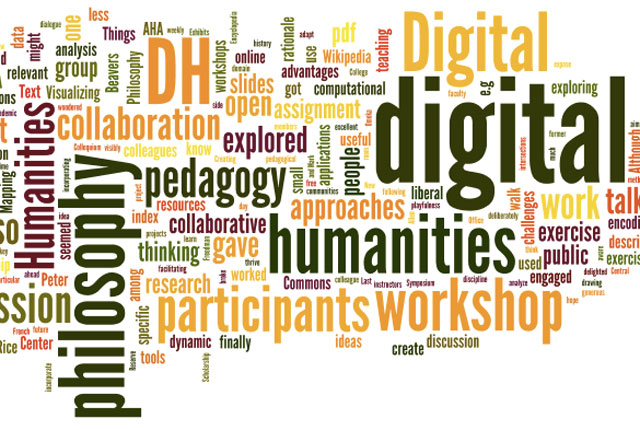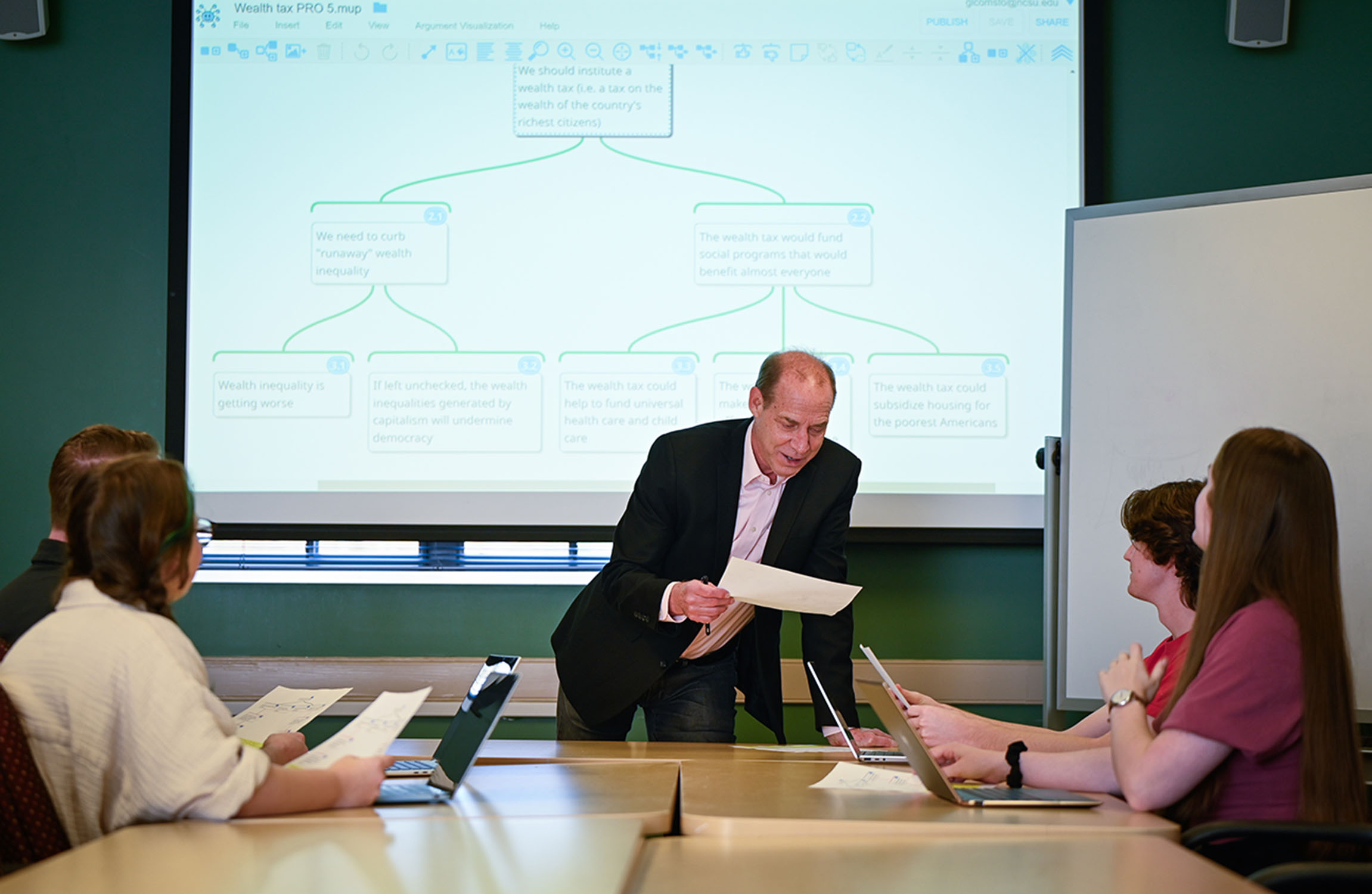Digital Humanities: Get Certified

 #dhpack: The Wolfpack hybrid hashtag signals a growing community in digital humanities. So does NC State’s new graduate certificate in digital humanities. But what’s it all about?
#dhpack: The Wolfpack hybrid hashtag signals a growing community in digital humanities. So does NC State’s new graduate certificate in digital humanities. But what’s it all about?
Communication intern Katie McCreary spoke with Paul Fyfe, Coordinator of Digital Humanities for the Department of English, about digital humanities, and what the new certificate means for the college, the university and the greater community.
KM: For starters, can you explain what is meant by digital humanities? PF: Since 2004, that’s the name we’ve used for a set of shared practices and interests in the humanities disciplines. It describes how computation studies of digital media are changing the materials and methods of how we do our work in humanities fields. However, the concept dates back to the 1940s, when it was called ‘humanities computing.’ At that time, a team led by Roberto Busa was using punch cards and a mainframe to create a concordance (a reference guide to all the words in a corpus). I think the way we tell the story of digital humanities is often wrong; it didn’t surface from a technological revolution, rather it was more of an evolution of conversations spurred by the type of computational tools and shared practices that are brought together under the big tent – what we now call ‘digital humanities.’ KM: How long has this graduate certificate program been in the works at NC State? PF: Digital media came into the national, and even international, spotlight in the early 2000s. People in the Triangle area wondered about the regional community that could be developed. After conversations among NC State, Duke, The Triangle Digital Humanities Network (TDHN) and UNC-Chapel Hill, they developed a plan with three main goals, one of which was a graduate training program. That’s what we’re offering now. It made more sense that the particular institutions developed their own programs. UNC-Chapel Hill’s program has been underway for about two years. I would also note that there is a growing interdisciplinary community at NC State and the certificate is an important aspect of this broader research and teaching community. KM: What’s special about NC State’s certificate program? PF: Our digital humanities certificate is flexible, interdisciplinary, and beneficial to a diverse set of students from different academic backgrounds. Rather than following a prescribed curriculum, students work closely with a coordinator to devise their own personalized curriculum and create a course load that meets the students’ research criteria. This certificate is designed for students who are enrolled in or who have completed a Master’s or PhD program. Applicants can be either non-degree or degree-seeking students. KM: How will this program augment academic life at the college? PF: Here are four things it brings: First, I think a lot of our students are already interested in the subject and pursuing digital research in their own work, so this will allow them a way to credential what they are already doing. Second, it will encourage other students to take their research in innovative directions. It will give them the impetus and motivation to explore different methods in their research. Next, it encourages faculty to shape their courses or develop courses that engage digital media in different ways. And fourth, I think it will bring an increased sense of community around digital humanities for the students, faculty, and researchers. It will create a broader and stronger community. KM: What can you do with this certificate? What does it qualify people for?  PF: I think it signals to people that you can add this set of perspectives to your expertise in your domain. You don’t get a degree in digital humanities, you have a discipline, or a field, and digital humanities is the set of conversations you favor to make contributions to the field and even beyond it . KM: The website says the certificate will allow students to “expand their pursuits for a variety of academic, alternate academic (#altac), and professional goals.” Can you define alternate academic (#altac) goals? PF: This is part of another huge conversation and concern. Digital humanities has been quite aggressive about saying that yes, we have the capacity to train people outside of academia. In a nutshell, it was a way of thinking about legitimizing other pursuits — about validating career trajectories that don’t always replicate tenure track faculty lines. (Read more about #altac here ) KM: The website lists a large number of resources and facilities that certificate students can access. Is there more? PF: Well, what isn’t on the list is the community and the events and workshops that we intend to build around the community. I’ve been in discussions with the library about starting this up. There are similar things happening all over the Triangle and NC State will be a part of all that. KM: The certificate program starts Fall 2015. When can students start to apply? PF: Now! Check out the “Apply” section on our website. KM: How long should it take a student to earn the certificate? PF: Students have up to three years from the day they start. For more information about NC State’s new graduate certificate program, visit go.ncsu.edu/dhcertificate
PF: I think it signals to people that you can add this set of perspectives to your expertise in your domain. You don’t get a degree in digital humanities, you have a discipline, or a field, and digital humanities is the set of conversations you favor to make contributions to the field and even beyond it . KM: The website says the certificate will allow students to “expand their pursuits for a variety of academic, alternate academic (#altac), and professional goals.” Can you define alternate academic (#altac) goals? PF: This is part of another huge conversation and concern. Digital humanities has been quite aggressive about saying that yes, we have the capacity to train people outside of academia. In a nutshell, it was a way of thinking about legitimizing other pursuits — about validating career trajectories that don’t always replicate tenure track faculty lines. (Read more about #altac here ) KM: The website lists a large number of resources and facilities that certificate students can access. Is there more? PF: Well, what isn’t on the list is the community and the events and workshops that we intend to build around the community. I’ve been in discussions with the library about starting this up. There are similar things happening all over the Triangle and NC State will be a part of all that. KM: The certificate program starts Fall 2015. When can students start to apply? PF: Now! Check out the “Apply” section on our website. KM: How long should it take a student to earn the certificate? PF: Students have up to three years from the day they start. For more information about NC State’s new graduate certificate program, visit go.ncsu.edu/dhcertificate


